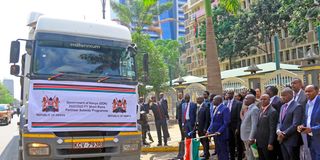Ensure sustainable food production

Deputy President Rigathi Gachagua flags off of DAP subsidised fertiliser to various regions of Kenya on September 22, 2022 at Harambee House Annex grounds. It is important that researchers remain at the head of the pack in as far as issues of dealing with food insecurity are concerned.
What you need to know:
- It is important that researchers remain at the head of the pack in as far as issues of dealing with food insecurity are concerned.
- With proper funding, research towards control methods of crop pests with minimal usage of pesticides is feasible.
- The time to act on food insecurity in a holistic manner is now, and not when our population clocks sixty to seventy million.
The excitement with which the subsidised fertiliser is being received in different parts of the country is indeed palpable.
However, it is important to realise that farmers face a multitude of hurdles in their effort to ensure that the production of food enough for their consumption and sale is realised.
It is in this view that a concerted approach toward dealing with food insecurity should be undertaken.
One key factor in the fight against food insecurity is research. It is important that researchers remain at the head of the pack in as far as issues of dealing with food insecurity are concerned.
It has been noted that pre-harvest and post-harvest losses of grains contribute to a significant deficit in the proportion of grains that would otherwise be available to mitigate food insecurity.
It is in this regard that funding for agricultural research ought to be upscaled. Research towards the development of food plants with a degree of tolerance to pests and also in combating pests is essential in dealing with food insecurity.
On a more specific note, the maize stock borer causes heavy pre-harvest losses, which, no doubt, researchers can delve into to come up with environmentally friendly approaches to combating the same.
In the veterinary field, breakthrough approaches toward dealing with livestock pests have been realised.
Among them is the use of sterile males in the control of tse tse flies in endemic areas and also control of screw worms in the US.
With proper funding, research towards control methods of crop pests with minimal usage of pesticides is feasible.
The time to act on food insecurity in a holistic manner is now, and not when our population clocks sixty to seventy million.
We really don't have the luxury of time and the new crop of leaders should demonstrate that through deeds and actions.
Muriithi King'au, Laikipia
The triple planetary crisis of climate change, pollution and biodiversity loss represents the single greatest human rights challenge of our era.
As each day passes, our collective delays and inaction in addressing this crisis bring us closer to an alarming global catastrophe.
Concrete action is paramount for our very survival. Last year, the Human Rights Council adopted a historic resolution recognising the human right to a clean, healthy and sustainable environment.
What matters is that all societies takes on board the full contributions of everyone to achieve changes for social justice, for human rights and for our planet.
A human rights-based economy will build the resilience of societies against future shocks. It will strengthen social cohesion and contribute to the prevention of conflicts and instability.
Emily Kaberia, Meru




